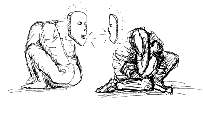 |
|
 |
|||||||
by Daniel C. Dennett (1991) Dennett is a philosopher who takes hard science very seriously, especially cognitive psychology. This book changed my concept of the human being. Dennett reveals the flaws of the "normal" view of human consciouness (that there's a little person in your head watching your body's input on a big screen) and reveals how persistent this metaphor is even among those who ought to know better. If you think you don't believe in the little person sitting in front of the screen, you might want to read this book to be sure that this metaphor doesn't still affect your model of consciousness. It affected mine. Dennett provides a new hypothesis of human consciousness, basically that consciousness is a set of actions in the brain, which actions are not strictly related in serial time. What I took away from Consciousness Explained is: Rapid Access Unconscious Subsystems Gappy Consciousness Timing Even if your brain registers content A after content B, if it concludes that A happened before content B, then we perceive it as happening first. This is a big idea. You don't first experience content B, then experience content A, and then judge that A happened first. Instead, content B takes place, then content A takes place, and content A seems like it happened first. This out-of-sequence timing occurs for very fleeting events. The brain's fast enough to get slower events in chronological order. It should be obvious that the order in which your brain registers content and the order in which that content seems to happen in the outside world need not coincide. The color of the apples seems to be red even though there's no red in your brain corresponding to the apple's color. Likewise, content A seems to be first even though it took shape in the brain after content B. You don't experience moments one after the other like someone sitting in a movie theater watching one's life on the screen. Your sense of time is a sense like your others. Outstanding Issue: Qualia My guess is that Dennett's describing consciousness is like Darwin's describing evolution when people talked about "blood" instead of genes: the theory right in general, but there's a missing concept without which the theory isn't fully explicable. Dennett's hypothesis seems right, but I can't help but feeling that there's a leap he's making that won't be a leap any more, once some new scientific discoveries show us the bridge across the conceptual chasm. Outstanding Issue: Immortality I don't see that as meaningful immortality. It wouldn't do me any good to have a computer replica of me enjoying life on the other side of the world. Nor would it do me any good to have a computer replica of me enjoying life in the future. Sure, in either case the computer replica would be "me" as near as anyone could tell, but it wouldn't be me being me. (It's Jehovah's clones all over again.) What's the difference between me and a robot just like me? you might ask. None. Physical immortality wouldn't do me any good, either. Tangent: The Matrix —JoT top Rorty & Dennett on Truth and Perception: another angle on Dennett center of gravity: Center of mass, balance point; an idea, something that's at once useful and fictitious. center of narrative gravity: The self whose theory Dennett describes. This concept embodies the terms "center of gravity" and "narrative." narrative: If the subjectivity of postmodern thought drives you nuts, then look out for the word "narrative." "Narrative" basically means "account." It's a story, myth, theory, novel, tenet, or other recounting of events. What makes this term popular among the postmodernists is that it doesn't prejudge the nature or accuracy of the "narrative." The periodic table of the elements is a narrative. So is the Bible. Only someone dedicated to withholding judgment would put the Bible and the periodic table of elements in the same category. |
|||||||